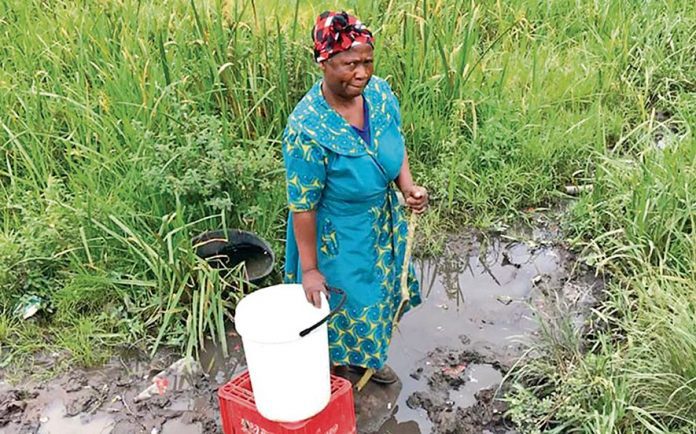Johannesburg- For many rural communities in KwaZulu-Natal, water famine is a reality, with some households forced to pay bogus water trucks to access clean and drinkable water at a hefty price.
Those villagers who cannot afford the exorbitant water price from private owners have to trek kilometres in search of a precious resource and often resort to sharing dirty water with livestock.
Zothile Ngema of Gunjeni village under the Mtubatuba local municipality on the KwaZulu-Natal north coast hesitates for a moment before lamenting their water woes, saying drinking unhygienic water has become a norm for the villagers.
“We are one of the forgotten communities. Politicians only come to us when they want our vote. Once we have voted them to power, they forget that we exist. For decades we have been without clean water. The streams, which are our only source of water, are also getting dry,” said Ngema.
She said women and school children bore the brunt of shortages because they had to walk punishing distances in search of water.
“We get up in the early hours of the morning and walk about 4km then wait for the muddy water to be cleared. We navigate through dangerous terrains with girl children. Unlike us, they still have the energy,” she said.
Ngema added that children fetch water twice a day, before and after school. “They have to also juggle this with house chores and their school work.”
In a recent report titled Condition Assessment of Existing Infrastructure, the provincial department of cooperative governance and traditional affairs notes that close to half a million families in KwaZulu-Natal cannot access water.
The report was part of the province’s water master plan.
According to premier Sihle Zikalala, the water master plan was a blueprint for the medium- to short-term planning and delivery of water infrastructure in the province. About R150-billion is needed to set the ambitious plan into motion.
Babili Mhlongo of the drought-stricken village of eMacekeni in Nongoma on the heartland of KwaZulu-Natal said the battle for water evoked bad memories for the Mhlongo family. In 2015, his 15-year-old son Qiniso Mhlongo was stoned to death by a group of youth from another village over water.
Qiniso was caught in the crossfire when he tried to rescue his sisters who were being assaulted by young men, who accused them of contaminating water from the stream.
The perpetrators allegedly made sexual advances, demanding that the three young women “compensate” them for polluting the water. Annoyed, young Qiniso tried to rescue his siblings from the ordeal but was overpowered and stoned to death by the perpetrators.
“My son died because of a fight that was sparked by water. His tragic death will live with me forever. When it comes to voting, I will vote for whatever party that promises to deliver clean water,” said Mhlongo.
Nosicelo Latha of eMfulamuhle in uMzimkhulu, KwaZulu-Natal south coast, also shares her own story about the ongoing struggle to access water.
“We collect water at the uMzimkhulu River. The water is often polluted, and it is a health hazard because people perform rituals and throw animal skins in the river. We hope this time the new councillors will prioritise water provision,” she said.
Umsinga and Ugu districts are also affected by the lack of water supply. The severe water crisis in Umsinga prompted the UDM to write to the Human Rights Commission requesting the commission to intervene and compel the uMzinyathi district to supply the rural communities with clean water.
For more political news and views from this week’s newspaper, click here.
Follow @SundayWorldZA on Twitter and @sundayworldza on Instagram, or like our Facebook Page, Sunday World, by clicking here for the latest breaking news in South Africa. To Subscribe to Sunday World, click here.
Sunday World



